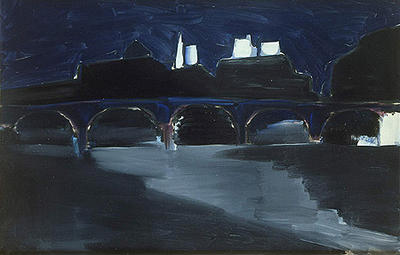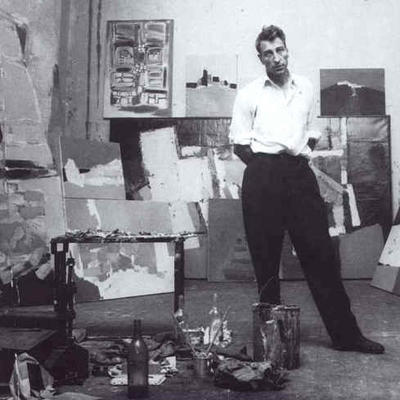
Harry Bellet has a review (
Au Musée Picasso d'Antibes, les ultimes peintures de Nicolas de Staël, August 11), in
Le Monde, of a new exhibit at the
Musée Picasso in Antibes.
Nicolas de Staël, un automne, un hiver will be on view through October 16. Painter Nicolas de Staël von Holstein threw himself from the window of his studio in Antibes, in southern France, 50 years ago this year. The major retrospective two years ago (
Nicolas de Staël: L'exposition, curated by Jean-Paul Ameline et Bénédicte Ajac, at the Centre Pompidou) was a blockbuster success in France, proving this artist's popularity. (There was also an exhibit,
Nicolas de Staël: Paintings from Museums and Private Collections of Western Europe, United States and Russia, at the Hermitage in the same year.) With over 200 works, what could the Pompidou have missed? Apparently, they showed only about 20 paintings from Staël's Antibes period, compared to 80 Antibes paintings and drawings at the Musée Picasso in this new exhibit.
 Other than a capricious mistress, whom the Antibes catalogue modestly labels a "model" and who was the inspiration of this period's sumptuous nudes and who drove Staël crazy, his life could certainly pass for happy. The years of misery, when he was painting La Vie dure (1946) and Brise-Lames (1947, significantly subtitled Brise-à-l'âme on its back), were far behind him. His shows, especially in New York, had made him rich. His friends were devoted, numerous, and top-notch, from Georges Braque to René Char. Romuald Dor de La Souchère, then director of the Antibes Museum, already wanted to devote a retrospective to him.
Other than a capricious mistress, whom the Antibes catalogue modestly labels a "model" and who was the inspiration of this period's sumptuous nudes and who drove Staël crazy, his life could certainly pass for happy. The years of misery, when he was painting La Vie dure (1946) and Brise-Lames (1947, significantly subtitled Brise-à-l'âme on its back), were far behind him. His shows, especially in New York, had made him rich. His friends were devoted, numerous, and top-notch, from Georges Braque to René Char. Romuald Dor de La Souchère, then director of the Antibes Museum, already wanted to devote a retrospective to him.
Nevertheless, in his self-imposed solitude in Antibes, there was one other thing that escaped him: painting. On March 5, 1955, ten days before his death, he took a short trip to Paris. He saw some friends, including his son-in-law Antoine Tudal, to whom he confided the turbulent state of his soul, tying his existence to his art: "You know, I don't know if I am going to live a long time. I think that I have painted enough. I have done all I wanted to do..." Then, back in Antibes, he started two paintings, including one that was 21 square meters [226 square feet] in size, on the theme of the concert [Le grand concert]. That was March 10, 1955: Staël had less than a week to live.
In his final letter to Jacques Dubourg, Staël wrote tragically, "I do not have the strength to finish my paintings."
Nicolas de Staël, un automne, un hiver will be on view at the
Musée Picasso, in Antibes, through October 16.
 Harry Bellet has a review (Au Musée Picasso d'Antibes, les ultimes peintures de Nicolas de Staël, August 11), in Le Monde, of a new exhibit at the Musée Picasso in Antibes. Nicolas de Staël, un automne, un hiver will be on view through October 16. Painter Nicolas de Staël von Holstein threw himself from the window of his studio in Antibes, in southern France, 50 years ago this year. The major retrospective two years ago (Nicolas de Staël: L'exposition, curated by Jean-Paul Ameline et Bénédicte Ajac, at the Centre Pompidou) was a blockbuster success in France, proving this artist's popularity. (There was also an exhibit, Nicolas de Staël: Paintings from Museums and Private Collections of Western Europe, United States and Russia, at the Hermitage in the same year.) With over 200 works, what could the Pompidou have missed? Apparently, they showed only about 20 paintings from Staël's Antibes period, compared to 80 Antibes paintings and drawings at the Musée Picasso in this new exhibit.
Harry Bellet has a review (Au Musée Picasso d'Antibes, les ultimes peintures de Nicolas de Staël, August 11), in Le Monde, of a new exhibit at the Musée Picasso in Antibes. Nicolas de Staël, un automne, un hiver will be on view through October 16. Painter Nicolas de Staël von Holstein threw himself from the window of his studio in Antibes, in southern France, 50 years ago this year. The major retrospective two years ago (Nicolas de Staël: L'exposition, curated by Jean-Paul Ameline et Bénédicte Ajac, at the Centre Pompidou) was a blockbuster success in France, proving this artist's popularity. (There was also an exhibit, Nicolas de Staël: Paintings from Museums and Private Collections of Western Europe, United States and Russia, at the Hermitage in the same year.) With over 200 works, what could the Pompidou have missed? Apparently, they showed only about 20 paintings from Staël's Antibes period, compared to 80 Antibes paintings and drawings at the Musée Picasso in this new exhibit.Other than a capricious mistress, whom the Antibes catalogue modestly labels a "model" and who was the inspiration of this period's sumptuous nudes and who drove Staël crazy, his life could certainly pass for happy. The years of misery, when he was painting La Vie dure (1946) and Brise-Lames (1947, significantly subtitled Brise-à-l'âme on its back), were far behind him. His shows, especially in New York, had made him rich. His friends were devoted, numerous, and top-notch, from Georges Braque to René Char. Romuald Dor de La Souchère, then director of the Antibes Museum, already wanted to devote a retrospective to him.

Si compiono in questo 2014 i cento anni dalla nascita di Nicolas De Staël (1914-1955), icona della cultura francese del dopoguerra.
ReplyDeletesegnalo alcune iniziative che vogliono celebrare la data:
http://www.artonweb.it/arteartonweb/articolo91.html